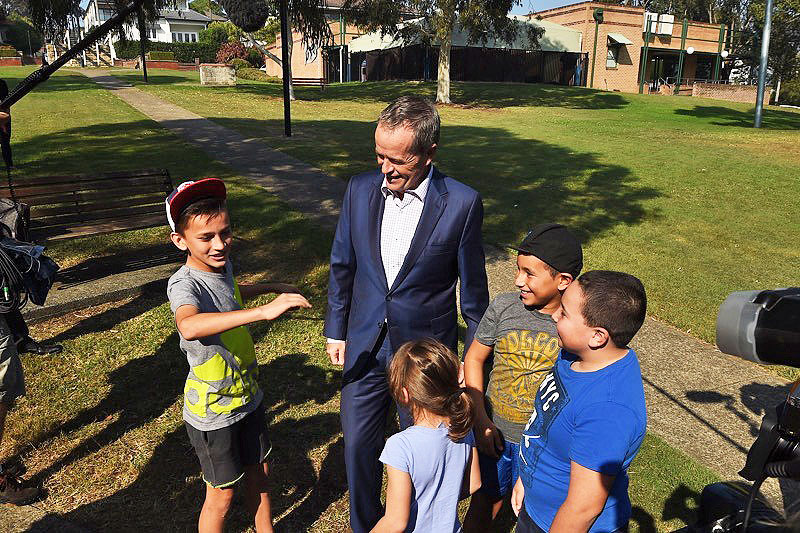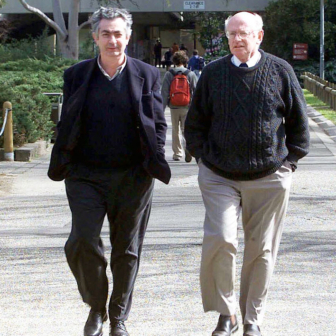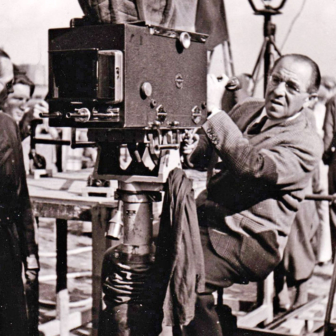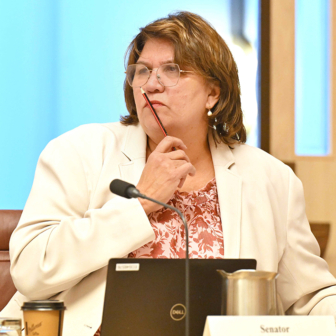For the Common Good: Reflections on Australia’s Future
By Bill Shorten | Melbourne University Press | $27.99
Many Australians still seem to be making up their minds about Bill Shorten. He’s been in the public eye, in one guise or another, for many years now, but not for as long as his much older electoral rival, Malcolm Turnbull. He came to federal politics from a career as a national union leader – most recently as national secretary of the Australian Workers’ Union, or AWU – but was nowhere near as recognisable when he entered parliament as Bob Hawke was when he became the humble Member for Wills in 1980.
Hawke the parliamentarian didn’t need to tell us his story because he had loomed large on the national scene for years, a media superstar of the 1970s as surely as TV’s Graham Kennedy. Shorten is not so comfortably placed. Australians came to recognise him as the concerned union official during the Beaconsfield mine rescue in 2006, but it’s doubtful whether much else about his career has registered – except, perhaps, his role as the man glued to the mobile phone when Kevin Rudd was being deposed in 2010.
That role in Labor’s federal leadership dramas is among the issues Shorten deals with in For the Common Good. While he plays down his part in the fall of Rudd, he hasn’t changed his mind about the need for a new leader; but he acknowledges that the party failed to explain adequately to voters why it acted. He also recalls his role in the demise of Julia Gillard, arguing that he owed greater loyalty to the Labor Party than to any individual and that Rudd was in a better position to minimise the losses at the 2013 election and preserve some of Labor’s policy legacy. We can easily believe this claim: it’s hard to imagine Shorten (or too many others) having supported Rudd for a second time if they’d imagined he was likely to be around to trouble them for more than a few months.
Neither of these explanations of Shorten’s actions at those pivotal moments is unreasonable. But the impression that he was up to his neck in that era’s leadership machinations is still hard to shake off, not least because it seems accurate enough (at least in connection with Rudd’s downfall in 2010). It’s notable that Shorten didn’t cooperate with Sarah Ferguson’s television documentary of the Rudd and Gillard era, The Killing Season. He is understandably sensitive about being thought of as one of Labor’s “faceless men,” an uncomfortable platform for national leadership.
For the Common Good is Shorten’s effort to explain himself, to tell the story of his formative years and their connections to his career in the labour movement and his leadership of the Australian Labor Party. In places, it can be a defensive document. In the second chapter, “A Labour of Love,” he provides his answer to the royal commission on trade union corruption. His approach to bargaining with employers, he explains, was guided by the belief that he could work “in a meaningful, cooperative way” with both bosses and employees. And his role required him to negotiate agreements “that adapted to new circumstances in the workplace.” It was in the interests of employers that their workers were able to “bargain constructively” in the new industrial relations system of the 1990s, and so they contributed money to the AWU to help them do so.
It’s a feisty defence, and none of it is unreasonable, but Shorten conveniently leaves out the fact that his union’s notably cooperative attitude to employers increased his own power and advanced his career. And there are clearly workers who felt that their interests were not well-served by some of the deals that the union struck. Like Hawke before him, Shorten moved into the social circles of wealthy men like Dick Pratt, who is not mentioned in these pages. In the snake-pit of Victorian factional politics, he became a man whose opinion mattered.
“Excessive factionalism is damaging to political parties,” he tells us – with a straight face or not, it’s impossible to say. It’s especially bad in the youth wings of the parties, he continues, and he “probably indulged in a bit of it in his youth.” (By this time, we might see a wry grin. Read Aaron Patrick’s admirable account of the young Bill in Downfall, which I reviewed for Inside Story, if you’d like a more vivid picture.)
Shorten weaves other aspects of his own story around his plans for the nation. We already know some of the biographical details from Patrick’s book and from other commentators, including David Marr. There’s the often absent father, the hard-drinking seaman and union official who mixed with some of the more colourful characters on the Melbourne wharves (a couple of whom were shot dead during the vicious internecine battles of the Painters and Dockers Union). There’s the very present, strong and self-improving mother, who takes out a string of university degrees and ends up an academic at Monash University.
Shorten emphasises that he was not born to the purple, as Robert Menzies once said of his own humble upbringing as a country shopkeeper’s son; but it’s extraordinary that this family sent Shorten and his twin brother to the most exclusive Catholic private school in Victoria, Xavier College. It was surely not out of religious piety, for Shorten’s mother regularly took the boys to a Catholic mass conducted in Polish, a language that none of the family could understand, because, as she explained, “It’s quick.”
From the Jesuits, Shorten says, he learned the ideal: “To be men for others.” He considered social work but instead studied arts and law at Monash and became an industrial lawyer and then a union organiser. Much of what Shorten professes to believe politically came out of this experience of dealing with ordinary members of his union, but there was also plenty of trade unionism on both sides of his family. His account of growing up in Melbourne has a strong elegiac note: a sense that something worthwhile was lost as the inner-city ports became less busy, factories closed and cherished institutions, such as the South Melbourne Football Club (which he supported), fell apart.
Shorten went to work for a union that was the most famous of them all, the AWU, an organisation whose history is woven into the very fabric of the union movement and is central to Labor’s claims to Australia’s national story. Once a shearers’ union, it evolved into a general union of workers and its Victorian branch, in particular, was in a dire state when Shorten went there in the mid 1990s. He proved a gifted organiser and capable official, but there might also have been a little nostalgia operating in his choice of a career in the legendary union, alongside the budding politician’s eye for the main chance: the AWU, after all, controlled a lot of votes on the floor of Labor conferences, and therefore a lot of preselection votes.
Indeed, a sense of political and industrial “yesteryear” hangs about Shorten’s public persona, despite the number of pages he spends in this book expounding the importance of cutting-edge science to the future of the country. The final pages of this book, for instance, are pure Hawke; it could be 1983 all over again. Shorten even advocates a national summit to promote “a more flexible and consensus-driven politics.”
Shorten’s outline of the priorities Labor would pursue if it were elected to government contains few surprises. Here, the book takes on some of the qualities associated with the manifestos released by British political parties. There are plenty of policy proposals that, if implemented properly, would make for a better country. There are also quite a few, like his proposal to create in the national capital an Australian version of Washington’s Arlington National Cemetery, that I suspect we’ll hear nothing more about. His suggestion of a college of state and territory governors from which the president of a republic might be chosen is plain silly as a way of responding to the objections of direct electionists. He maintains the old Labor line on supporting offshore detention and the newer one on boat turnbacks, while criticising his opponents for keeping asylum seekers for too long. But this is a little rich when we consider that the Manus Island shambles is to a large extent the handiwork of Labor Party policy during the second Rudd prime ministership of 2013.
The words and ideas jump out and hit one with greater force as he discusses disability insurance, something he actually knows about. The prose soars; the sense of empathy with the suffering of others is palpable. Shorten’s role in forging the National Disability Insurance Scheme has also become part of his story, critical in demonstrating that he is more than a run-of-the-mill Labor backroom operator.
Shorten also argues compellingly for a carbon market to deal with global warming, wants much greater investment in renewables, and thinks governments should take advantage of low interest rates to borrow capital for building infrastructure. He likes high-speed rail. Governments need to cast aside the assumptions of Reagan-era trickle-down economics, he says, and work for the more equal society that is a precondition for growth, not its outcome. All of this is good post–global financial crisis Labor stuff, and quite enough to keep a new government well occupied for some years, especially if Shorten is serious about helping state governments fix urban gridlock with investment in public transport.
There’s much on the importance of education in preparing Australians to adapt to a rapidly changing world. But Shorten’s attitude to its purpose, if this book is any indication, is mainly instrumental; it will lead to higher productivity, better wages and a stronger economy. He recognises, in passing, that education also matters for other reasons – that it might involve a sense of fun, excitement and discovery that can improve the quality of people’s lives and, by implication, raise the quality of the society to which they belong. But the thought never gives rise to more than a polite nod; not even in the context of his recognition that we are heading for life expectancies up around a century, and that education is already important to the lives of many people in their sixties and beyond.
There are paeans to STEM (science, technology, engineering and mathematics) that make Shorten sound a bit like Harold Wilson on steroids, but he devotes barely a word to the humanities, social sciences, creative industries, heritage, museums or the arts. He plans to give those studying the sciences at university a full fee rebate, an ambitious and (one suspects) foolish piece of educational engineering likely to push many young people into courses and careers for which they have little aptitude. He tells us that the Australian War Memorial is the best museum in the country but given his silence on the GLAM (galleries, libraries, archives and museums) sector more generally, we have good reason to be sceptical about his judgement. The less polite reader might be inclined to dismiss it, like the national cemetery proposal and the affirming nod of this former army reservist to the excellence of our defence force, as dutiful Anzackery on the part of a Labor leader desperate to advertise his patriotism and national security credentials.
No one reading this book will confuse Bill Shorten with a great social-democratic visionary. “The paramount ambition of a Labor government has to be creating good jobs, jobs with a future and jobs of the future.” One might have thought that creating such jobs – to the extent that modern governments can actually do so – might rather be a pathway to a satisfying quality of life, the unleashing of talents, and a cohesive and decent society. No doubt Shorten would agree; but it’s telling that in his rhetoric about why jobs and education matter, he seems unable or unwilling to untangle means and ends. It speaks to the way everyday political discourse in this country – the safe stuff that mainly keeps your average political leader out of trouble and the rest of us comatose – will even dominate the efforts of a thoughtful political leader to articulate an enlarged vision of “the good society.”
But that might not, in the world of electoral calculation, be such a terrible thing. This doesn’t seem to be the age for visionaries, even if we might need a few to help us out of the policy quagmire into which we’ve been led by the political class over the last decade or two. Most electors recall where Rudd’s grandiosity ended up, just as they remember and dislike the bitter divisions of the Gillard interlude and the excruciating embarrassment of the Abbott years. Most recently, they’ve witnessed the rapid transition of Malcolm Turnbull from national saviour and inspiration to yet another incredible shrinking prime minister.
Shorten is at pains to emphasise that he won’t be another Kevin Rudd, a feat he manages easily without having to mention the name of that late and unlamented prime minister. “Any government I lead,” he writes, “will operate in a collegial, consultative manner where cabinet decision-making processes and caucus debate are taken seriously.” David Marr thought that if Shorten had taken up the opportunity offered him earlier in his career of entering state politics, he would likely have become “a fine premier of Victoria.” I would add that if he makes it to prime minister, he would probably bring to the job the pragmatic, consensual, low-key, policy-driven approach of some of the best Labor premiers of recent years: Steve Bracks and Jay Weatherill springing readily to mind. Shorten just doesn’t have the type of charisma that recalls a Hawke or a Keating, or even, at the state level, a Neville Wran, Bob Carr or Peter Beattie. As a parliamentary and media performer, he’s dutiful and conscientious; while not without passion, humour or wit, he can’t match Turnbull’s seemingly effortless performance of rhetorical spontaneity.
Yet it somehow became possible, over the past eighteen months or so, for growing numbers of Australians to imagine a “prime minister Shorten.” As federal opposition leader, he’s been level-headed, dogged and hard-working. He’s benefited from a notable party unity, and the new rules for leadership elections adopted in 2013 at Rudd’s instigation have seen him through the times when there have been mutterings or worse about his leadership. Opinion polling now indicates that electors are willing to reward him for his persistence; with a respectable showing, if not necessarily a victory.
But will Labor keep him if he loses the 2016 election, an outcome that remains distinctly possible? That might ultimately depend on the margin, as well as on opinions about his performance in this seemingly never-ending campaign. But my hunch is that whatever happens on election day itself, the federal Labor Party would be foolish to cast him aside lightly. •




